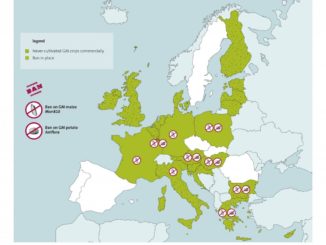Writing in the Nouvel Observateur’s Le Plus column over the weekend, MEP Corinne Lepage expressed her surprise at the partiality of the European Food Safety Authority in its unseemly haste to try and discredit the findings of Dr Eric-Gilles Séralini last week. There is a clear conflict of interest when one of the peer reviewers is already a signatory to the EU’s current 2003 approval for Nk603 GM maize and is asked to review a damning inditement of this cereal’s safety.

Lepage called for EFSA to be rendered fit for purpose: article 23 requires it to provide the public with reliable, objective and comprehensible information. Article 23 also requires EFSA to express its own conclusions in an independent way, which has hardly the case in this instance.
Since the other reviewer was a member of the OECD’s Endocrine Disrupters Testing and Assessment task force, he too has a conflict of interests. On September 28, Séralini’s publication was the subject of a rapidly convened telephone conference of the EFSA Emerging Risks Unit, which set up an ad hoc panel under EFSA’s Director of Scientific Evaluation of Regulated Products (REPRO) Directorate Per Bergman. According to a Dutch health department account of the meeting, Bergman opened by explaining that their task was to address scientific concerns and avoid divergence.
Among 22 people in the telephone conference, ministry civil servants from four member states were briefed by a battery of EFSA officials. The member states were Belgium, France, the Netherlands and Germany.
At one point a Belgian official volunteered to write a stiff complaint to the academic publisher handling Séralini’s publication. The zealot had to be dissuaded on the grounds that “the scientific community” had already responded forcefully enough.
The way in which EFSA places GM approvals ahead of public health issues has revived calls by the GM-Free Cymru group to break the administrative logjam that sidelined European Parliament petitions 0436/2010 and 0813/2008. Writing to the European Parliament, spokesman Dr Brian John described the EFSA response as “damage limitation” when faced with a challenging peer-reviewed paper that had been cleared for publication by a reputable journal.
Despite a carefully orchestrated barrage of calls for Séralini’s raw data, there is no mainstream indignation over the way commercial sensitivity arguments have been used to keep GM research data out of public scrutiny. The CRIIGEN website carried a short statement in French from Dr Séralini: “We don’t expect anything of EFSA, which has been badly wrong-footed by its conflicts of interest on GMOs, as I wrote in my book.”
What is more, Séralini adds, the agency is trying to act as both judge and jury in this case. It has authorised products that have undergone long-term testing by Séralini’s team and the results have been published in one of the world’s best toxicological journals.
“To authorise these products, EFSA has worked in a very lax manner and in a very short term time frame,” Séralini warns. His book, which has appeared in French, puts the scientific establishment in the dock for being corporate mouthpieces rather than being true to scientific principles.





